May 15, 2025 | 08:21 GMT +7
May 15, 2025 | 08:21 GMT +7
Hotline: 0913.378.918
May 15, 2025 | 08:21 GMT +7
Hotline: 0913.378.918
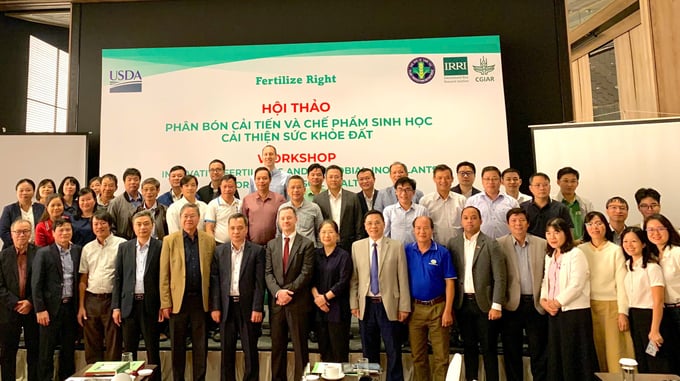
The Workshop on innovative fertilizers and microbial-inoculants for a better soil health was co-organized by the Plant Protection Department, the U.S. Department of Agriculture, and the International Rice Research Institute (IRRI). Photo: Kieu Chi.
On the morning of December 3, the Plant Protection Department, in coordination with the U.S. Department of Agriculture (USDA) and the International Rice Research Institute (IRRI), organized a seminar on advanced fertilizers and bio-based products for soil health improvement.
The seminar was held within the framework of the "Fertilizer Right" (FerRight) project, aimed at sharing information and knowledge about new types of fertilizers with the potential to improve usage efficiency and minimize negative environmental impacts. Additionally, it served as a platform for stakeholders to discuss the pros and cons of current solutions, as well as research gaps that need to be addressed to enhance fertilizer usage and promote sustainable soil health protection.
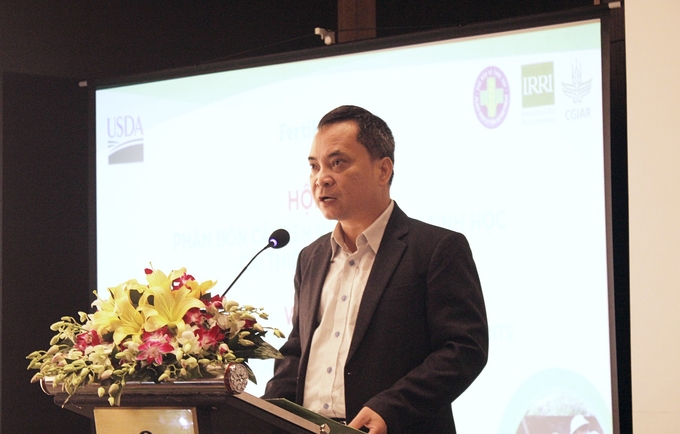
Mr. Nghiem Quang Tuan, Deputy Director of the Plant Protection Department had an opening speech. Photo: IRRI.
In his opening speech, Mr. Nghiem Quang Tuan, Deputy Director of the Plant Protection Department, stated: "The project on Fertilizer Right, approved by the Ministry of Agriculture and Rural Development (MARD), aims to encourage the protection and utilization of beneficial organisms, the use of highly effective bio-based fertilizers, and the adoption of advanced farming models. The goal is to maintain soil fertility, reduce greenhouse gas emissions, and increase farmers' income."
Mr. Tuan emphasized the importance of reducing the use of chemical fertilizers in agricultural production. "Inefficient fertilizer use not only raises costs but also causes environmental pollution and increases greenhouse gas emissions. The challenge is to improve rice quality, reduce carbon emissions, and enhance the economic value of rice, straw, as well as carbon credits."
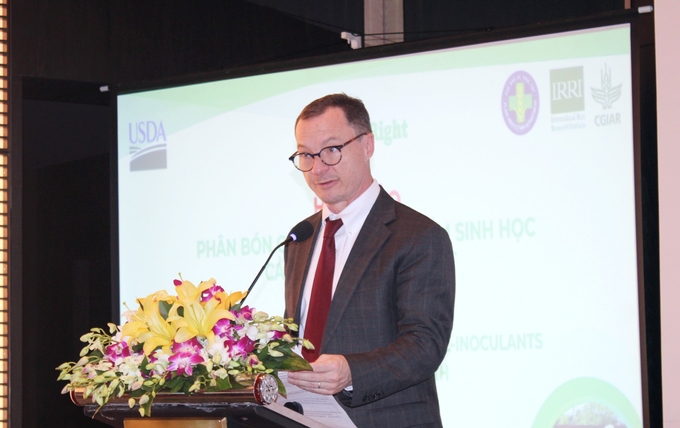
Mr. Ralph Bean, Agricultural Counselor of the United States, Embassy of the United States, made a speech at the workshop. Photo: IRRI.
Mr. Ralph Bean, Agricultural Counselor of the United States, shared the initial results of the FerRight project: "We have developed an initial database on innovative fertilizers, conducted field trials to determine optimal fertilizer application rates, and created tools to support farmers in applying sustainable soil nutrient management practices."
According to Mr. Ralph Bean, collaboration between partners such as the Plant Protection Department, USDA, and IRRI not only helps address current challenges but also lays the groundwork for further research in the future. In the coming time, the FerRight project will continue to strengthen research, refine supporting tools, and enhance connections with farmers and stakeholders to promote the application of sustainable solutions in production practices.
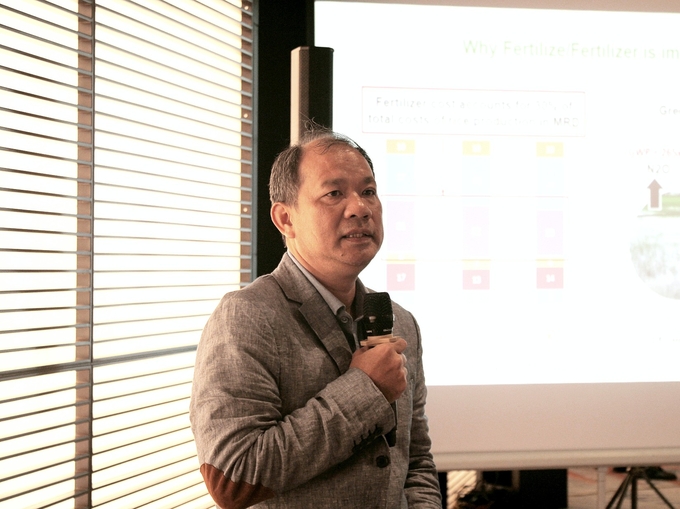
Mr. Nguyen Van Hung, a senior scientist at IRRI, noted: "The Mekong Delta currently spends about 30% of farming costs on fertilizers." Photo: IRRI.
According to Mr. Nguyen Van Hung, a senior scientist at IRRI, the output of the FerRight project includes a database on soil, fertilizers, and crop management; technology for direct seeding combined with fertilizer incorporation to enhance nutrient use efficiency; straw management and organic fertilizer production from straw; as well as microbiological technologies and electronic agricultural extension applications.
He stressed the need to pay particular attention to related and supporting technologies such as mechanized seeding combined with fertilizer incorporation, precision and digital agriculture, using straw-based organic fertilizers, and developing innovative fertilizers. This requires active participation and contributions from relevant stakeholders, including ministries, research institutes, universities, private enterprises, along with the development of databases and maps for managing land resources, nutrients, water, and climate change factors.
It is necessary to establish suitable solutions for each ecological sub-region. Additionally, enhancing capacity and changing the behavior of farmers and managers should focus on promoting new knowledge on applying precision agriculture to reduce inputs and emissions, managing straw through circular agriculture models, and developing electronic agricultural extension systems.
One of the notable solutions introduced at the seminar was the use of biochar, a carbon-rich solid that can improve soil microbiota, regulate carbon and nitrogen cycles, enhance water retention, and improve soil structure.
Ms. Leslie Honicker, an agricultural expert from the USDA, stated that soil health is facing numerous challenges such as saltwater intrusion, pH imbalance, microbial imbalance, pollution, and nutrient toxicity.
"Biochar helps increase fertilizer use efficiency, boosts chlorophyll content, and improves crop yields. The large particle structure of biochar enhances nitrate absorption and improves soil fertility," Ms. Leslie said.
Next-generation fertilizers, including organic fertilizers, slow-release fertilizers, controlled-release fertilizers, and bio-based products, are expected to optimize nutrient use efficiency under various farming conditions. According to Ms. Leslie, these fertilizers not only improve crop productivity but also contribute to reducing carbon emissions, promoting sustainable agriculture.
Translated by Kieu Chi

(VAN) The launch of the Vietnam green and low-emission rice brand is a positive signal for both businesses and farmers, marking readiness to reach new heights in the global market.

(VAN) The U.S. tariff will have a significant impact on Vietnam’s wood industry as well as the U.S. furniture market. A reasonable tariff rate would be beneficial for both sides.
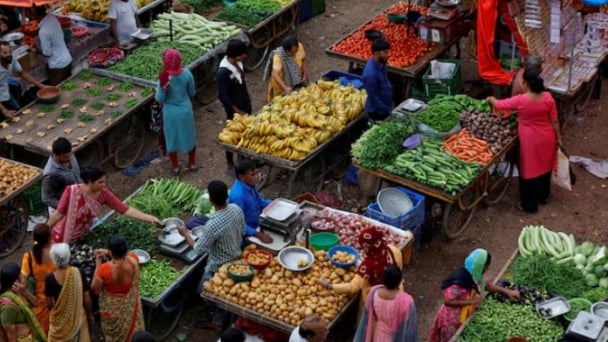
(VAN) India's retail inflation remained below the central bank's 4% target for the third consecutive month as food prices rose at a slower pace, opening up room for more interest rate cuts.
![Multi-channel, multi-directional Vietnamese agricultural markets: [5] Safety is the key](https://t.ex-cdn.com/nongnghiepmoitruong.vn/608w/files/linhnhp/2025/05/13/trai-cay-viet-nam-170345_133-221148-0908330.jpg)
(VAN) The Middle Eastern market presents new opportunities for Vietnamese agricultural products, but safety in product quality, payment, and partnership relations is a fundamental principle.

(VAN) Vietnam's participation in the AGROALBA project helps open up broader investment opportunities for enterprises to access markets in the fields of agriculture.

(VAN) On May 13, Deputy Minister of Agriculture and Environment Phung Duc Tien held a meeting with Cuban Deputy Minister of the Food Industry Javier Francisco Agular Rodriguez.
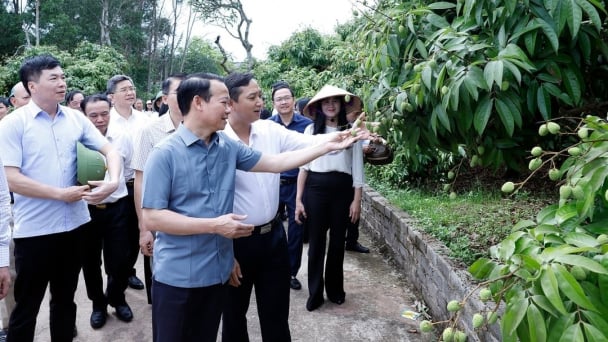
(VAN) Agriculture and environment sector experienced a 3.74% increase in growth during the first four months of 2025, with exports surpassing 21 billion USD. This growth was sustained by effective reforms and a trade surplus.